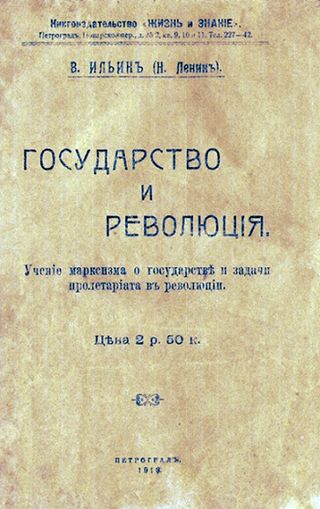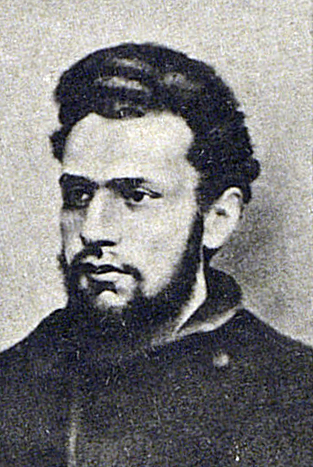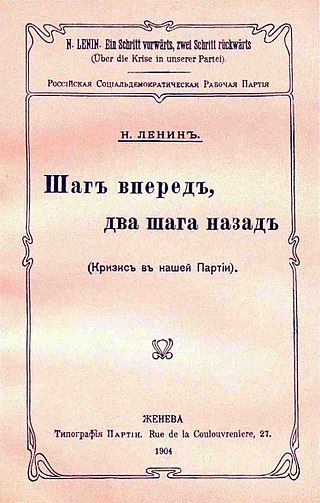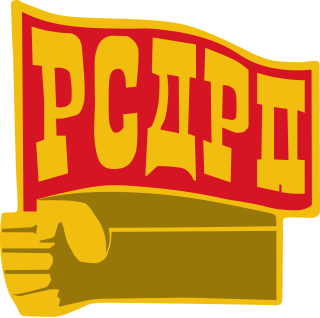This article needs additional citations for verification .(November 2013) |
Two Tactics of Social Democracy in the Democratic Revolution is one of Lenin's early writings.
This article needs additional citations for verification .(November 2013) |
Two Tactics of Social Democracy in the Democratic Revolution is one of Lenin's early writings.
It was written in June and July 1905, while the Russian Revolution of 1905 was taking place.
Lenin's preface poses a certain question: "in educating and organising the working class;...where should we place the main political emphasis in this work of education and organisation? On the trade unions and legally existing associations, or on an insurrection, on the work of creating a revolutionary army and a revolutionary government?"
| | This section needs expansion. You can help by adding to it. (April 2015) |

Leninism is a political ideology developed by Russian Marxist revolutionary Vladimir Lenin that proposes the establishment of the dictatorship of the proletariat led by a revolutionary vanguard party as the political prelude to the establishment of communism. Lenin's ideological contributions to the Marxist ideology relate to his theories on the party, imperialism, the state, and revolution. The function of the Leninist vanguard party is to provide the working classes with the political consciousness and revolutionary leadership necessary to depose capitalism.
Bolshevism is a revolutionary socialist current of Soviet Leninist and later Marxist–Leninist political thought and political regime associated with the formation of a rigidly centralized, cohesive and disciplined party of social revolution, focused on overthrowing the existing capitalist state system, seizing power and establishing the "dictatorship of the proletariat".

The State and the Revolution: The Marxist Doctrine of the State and the Tasks of the Proletariat in the Revolution is a book written by Vladimir Lenin and published in 1917 which describes his views on the role of the state in society, the necessity of proletarian revolution, and the theoretic inadequacies of social democracy in achieving revolution to establish the dictatorship of the proletariat.

Alexandr Martynov was a leading Menshevik politician before the Russian Revolution of 1917, and for a few years after the revolution a critic of Leon Trotsky's theory of permanent revolution (1923).

Mark Andreyevich Natanson was a Russian revolutionary who was one of the founders of the Circle of Tchaikovsky, Land and Liberty and the Socialist-Revolutionary Party. In 1917, he was a leader of the Left Socialist-Revolutionaries, which supported the Bolsheviks during the October Revolution. He was the uncle of Alexander Berkman.
Blanquism refers to a conception of revolution generally attributed to Louis Auguste Blanqui (1805–1881) that holds that socialist revolution should be carried out by a relatively small group of highly organised and secretive conspirators. Having seized power, the revolutionaries would then use the power of the state to introduce socialism. It is considered a particular sort of "putschism"—that is, the view that political revolution should take the form of a putsch or coup d'état.

"Left-Wing" Communism: An Infantile Disorder is a work by Vladimir Lenin attacking assorted critics of the Bolsheviks who claimed positions to their left. Most of these critics were proponents of ideologies later described as left communism. The book was written in 1920 and published in Russian, German, English and French later in the year. A copy was then distributed to each delegate at the 2nd World Congress of the Comintern, several of whom were mentioned by Lenin in the work. The book is divided into ten chapters and an appendix.

Iskra was a fortnightly political newspaper of Russian socialist emigrants established as the official organ of the Russian Social Democratic Labour Party (RSDLP).

One Step Forward, Two Steps Back: The Crisis in Our Party is a work written by Vladimir Lenin and published on May 6/19, 1904. In it Lenin defends his role in the 2nd Congress of the Russian Social Democratic Labour Party, held in Brussels and London from July 30 to August 23, 1903. Lenin examines the circumstances that resulted in a split within the party between a Bolshevik ("majority") faction, led by himself, and a Menshevik ("minority") faction, led by Julius Martov.

Red Guards were paramilitary volunteer formations consisting mainly of factory workers, peasants, cossacks and partially of soldiers and sailors for "protection of the soviet power". Red Guards were a transitional military force of the collapsing Imperial Russian Army and the base formations of Bolsheviks during the October Revolution and the first months of the Russian Civil War. Most of them were formed in the time frame of the Russian Revolution of 1917, and some of the units were reorganized into the Red Army during 1918. The Red Guards formations were organized across most of the former Russian Empire, including territories outside the contemporary Russian Federation such as Finland, Poland, Estonia, Ukraine, and others. They were not centralized and were formed by decision of a local political party and local soviet members. By fighting to protect and extend the power of the Soviets, they aided the creation of a new state that would give "all power to the soviets": the Soviet Union.

What Is to Be Done? Burning Questions of Our Movement is a political pamphlet written by Russian revolutionary Vladimir Lenin in 1901 and published in 1902, a development of a "skeleton plan" laid out in an article first published in early 1901. Its title is taken from the 1863 novel of the same name by the Russian revolutionary Nikolai Chernyshevsky.
A workers' council, or labor council, is a type of council in a workplace or a locality made up of workers or of temporary and instantly revocable delegates elected by the workers in a locality's workplaces. In such a system of political and economic organization, the workers themselves are able to exercise decision-making power. Furthermore, the workers within each council decide on what their agenda is and what their needs are. The council communist Antonie Pannekoek describes shop-committees and sectional assemblies as the basis for workers' management of the industrial system. A variation is a soldiers' council, where soldiers direct a mutiny. Workers and soldiers have also operated councils in conjunction. Workers' councils may in turn elect delegates to central committees, such as the Congress of Soviets.

The Mensheviks were a faction of the Marxist Russian Social Democratic Labour Party (RSDLP) which split with Vladimir Lenin's Bolshevik faction at the Second Party Congress in 1903. The Mensheviks were led by Julius Martov and Pavel Axelrod.

Sociology of Revolution is a 1925 book by Russian American sociologist Pitirim Sorokin. Sociology of revolution as branch of sociology was developed by Thomas Hobbes in Leviathan. to a certain extent earlier than Sorokin. Hobbes lived and created in the period of English Revolution. In the opinion by Hobbes, "the war of all against all" begins in the period of revolution and of Civil War, when all men threaten by each man, when each man has the right to all things by right of strong man, when "Man Is Wolf to Man" Sorokin had generalized the data about the new revolutions, unknowns for Hobbes – French Revolution, Russian Revolution (1917), etc.

The Russian Social Democratic Labour Party, also known as the Russian Social Democratic Workers' Party or the Russian Social Democratic Party, was a socialist political party founded in 1898 in Minsk.
In Marxist philosophy, the dictatorship of the proletariat is a condition in which the proletariat, or working class, holds control over state power. The dictatorship of the proletariat is the transitional phase from a capitalist and a communist economy, whereby the post-revolutionary state seizes the means of production, mandates the implementation of direct elections on behalf of and within the confines of the ruling proletarian state party, and institutes elected delegates into representative workers' councils that nationalise ownership of the means of production from private to collective ownership. During this phase, the administrative organizational structure of the party is to be largely determined by the need for it to govern firmly and wield state power to prevent counterrevolution, and to facilitate the transition to a lasting communist society.
Vanguardism, in the context of Leninist revolutionary struggle, relates to a strategy whereby the most class-conscious and politically "advanced" sections of the proletariat or working class, described as the revolutionary vanguard, form organizations to advance the objectives of communism. They take actions to draw larger sections of the working class toward revolutionary politics and to serve as manifestations of proletarian political power opposed to the bourgeoisie. This theory serves as the underpinning of the leading role of the Communist party, usually enshrined in the constitution, after the seizure of power in the state by Communists.
Soviet democracy, or council democracy, is a type of democracy in Marxism, in which the rule of the population is exercised by directly elected soviets, or workers' councils. The councils are directly responsible to their electors and bound by their instructions using a delegate model of representation. Such an imperative mandate is in contrast to a trustee model, in which the elected delegates are only responsible to their conscience. Delegates may accordingly be dismissed from their post at any time or be voted out (recall).

An index of articles related to the Russian Revolution and the Russian Civil War period (1905–1922). It covers articles on topics, events, and persons related to the revolutionary era, from the 1905 Russian Revolution until the end of the Russian Civil War. The See also section includes other lists related to Revolutionary Russia and the Soviet Union, including an index of articles about the Soviet Union (1922–1991) which is the next article in this series, and Bibliography of the Russian Revolution and Civil War.
Organizational Questions of the Russian Social Democracy, later republished as Leninism or Marxism?, is a 1904 pamphlet by Rosa Luxemburg, a Marxist living in Germany. In the text, she criticized Vladimir Lenin and the Bolshevik faction of the Russian Social Democratic Labour Party (RSDLP) for their position on democratic centralism—the theory behind a vanguard organization of communists having an elected leadership. Luxemburg argued that "spontaneity" of the proletariat is a major factor in socialist revolution. It was first published in Iskra, the RSDLP's newspaper, and Die Neue Zeit, the newspaper of the Social Democratic Party of Germany (SPD).